
Sanctity open to all

Chiara Lubich with Fr Pasquale Foresi. Photo credit: Loppiano archives


Chiara Lubich with Fr Pasquale Foresi. Photo credit: Loppiano archives
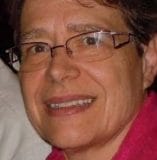

Chantal Grevin

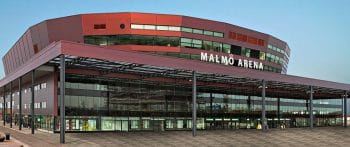 For the first time in 500 years Pope Francis, Bishop Munib Younana and General Secretary of the Lutheran World Federation, Rev Dr Martin Junge, will sign their names to the invitation for the 500th Anniversary of the Lutheran Reform in a highly significant gesture. Equally significant is the title that was chosen for the event: “From Conflict to Communion – Unity in Hope”. The event will be held on October 31st with an ecumenical service at the Cathedral of Lund, followed by a public ceremony at Malmö Stadium in Sweden. The Joint Declaration on the Doctrine of Justification (1999) was already a milestone for Catholic-Lutheran ecumenical dialogue, an important historical document that this year will serve as the theological basis the search of unity in the one Church of Christ. There has been a long history of friendship between the Focolare Movement and Lutherans. It was precisely the encounter with them that made Chiara Lubich realize that the spirituality that God had entrusted to her was not meant only for Roman Catholics.
For the first time in 500 years Pope Francis, Bishop Munib Younana and General Secretary of the Lutheran World Federation, Rev Dr Martin Junge, will sign their names to the invitation for the 500th Anniversary of the Lutheran Reform in a highly significant gesture. Equally significant is the title that was chosen for the event: “From Conflict to Communion – Unity in Hope”. The event will be held on October 31st with an ecumenical service at the Cathedral of Lund, followed by a public ceremony at Malmö Stadium in Sweden. The Joint Declaration on the Doctrine of Justification (1999) was already a milestone for Catholic-Lutheran ecumenical dialogue, an important historical document that this year will serve as the theological basis the search of unity in the one Church of Christ. There has been a long history of friendship between the Focolare Movement and Lutherans. It was precisely the encounter with them that made Chiara Lubich realize that the spirituality that God had entrusted to her was not meant only for Roman Catholics.  The history: On January 14, 1961, Chiara Lubich had been invited to speak about the spirituality of unity to the Lutheran Sisterhood of Mary. Among the listeners were several Lutheran pastors, including Klaus Hess and his wife Amalie, founders of the Brotherhood of the Common Life in Germany. A few months later the Hess couple visited Rome to know more about the Focolare Movement and the Catholic Church. On May 24, 1961, Chiara founded “Centro Uno” for the unity of Christians and, in June 1968 she inaugurated the Ecumenical Centre at the permanent Mariapolis in Ottmaring, Germany. Meanwhile the Focolare spirituality was being welcomed by bishops, Catholics, Evangelicals and Lutherans in East and West Germany. The spirituality of unity was also spreading in Sweden, and more than half the people at the Mariapolis were Lutherans. In 1982 bishops from different Churches began to attend the Movement’s annual gatherings for Catholic Bishops Friends of the Focolare. In 2015 there were 6 Lutheran bishops from three countries at the Focolare meeting for bishops in Constantinople. In 1988, Chiara was awarded the Augsburg Peace Prize. In 1999, she was an invited guest at the historic signing of the Joint Declaration on Justification in Augsburg. She was invited to compose a prayer that she recited at that solemn celebration. In 2003, the then Lutheran bishop of Munich, Johannes Friedrich, visited the Internationals Centre of the Focolare Movement with a delegation. Chiara spoke to them about Jesus Forsaken: “He presented himself (…) as the model to be imitated in every trial and especially in the pains of disunity; (…) [Jesus] Forsaken is also [the] light for recomposing full visible unity”[1]. In 2009, Focolare president Maria Voce was invited to the celebration of the 10th anniversary of the Joint Declaration. Since she will not be able to attend the 500th Anniversary of the Lutheran Reform, she will be represented by Friederike Koller and Ángel Bartol who are the Central Delegates of the Work of Mary.
The history: On January 14, 1961, Chiara Lubich had been invited to speak about the spirituality of unity to the Lutheran Sisterhood of Mary. Among the listeners were several Lutheran pastors, including Klaus Hess and his wife Amalie, founders of the Brotherhood of the Common Life in Germany. A few months later the Hess couple visited Rome to know more about the Focolare Movement and the Catholic Church. On May 24, 1961, Chiara founded “Centro Uno” for the unity of Christians and, in June 1968 she inaugurated the Ecumenical Centre at the permanent Mariapolis in Ottmaring, Germany. Meanwhile the Focolare spirituality was being welcomed by bishops, Catholics, Evangelicals and Lutherans in East and West Germany. The spirituality of unity was also spreading in Sweden, and more than half the people at the Mariapolis were Lutherans. In 1982 bishops from different Churches began to attend the Movement’s annual gatherings for Catholic Bishops Friends of the Focolare. In 2015 there were 6 Lutheran bishops from three countries at the Focolare meeting for bishops in Constantinople. In 1988, Chiara was awarded the Augsburg Peace Prize. In 1999, she was an invited guest at the historic signing of the Joint Declaration on Justification in Augsburg. She was invited to compose a prayer that she recited at that solemn celebration. In 2003, the then Lutheran bishop of Munich, Johannes Friedrich, visited the Internationals Centre of the Focolare Movement with a delegation. Chiara spoke to them about Jesus Forsaken: “He presented himself (…) as the model to be imitated in every trial and especially in the pains of disunity; (…) [Jesus] Forsaken is also [the] light for recomposing full visible unity”[1]. In 2009, Focolare president Maria Voce was invited to the celebration of the 10th anniversary of the Joint Declaration. Since she will not be able to attend the 500th Anniversary of the Lutheran Reform, she will be represented by Friederike Koller and Ángel Bartol who are the Central Delegates of the Work of Mary.
See: Statement issued from the 35th Ecumenical Meeting of Bishops friends of the Focolare Movement.
[1] Città Nuova 2003, 10, p 35
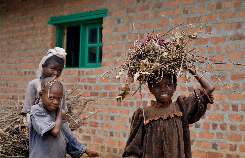
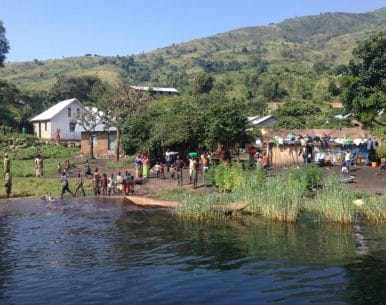 In school, the boys and girls use tree trunks as chairs and use their laps as desks. This all happens on the Isle of Idjwi in the middle of Lake Kivu, on the eastern side of the Democratic Republic of Congo. Because of its secluded location, it has been used as a platform for the secret movements of various military troops in the recent conflicts that have affected the country. On the island, many services are lacking such as the supply of electricity and transport. The population moves from the island to the mainland mainly by pirogue which, because of its instability, causes many deaths by sinking or drowning, leading to an extremely high mortality rate. The data gathered shows that in a family of five there is at least one widow or an orphan. The island’s economy is based on farming and fishing. In particular, beans, cassava, peanuts, soy beans and coffee are cultivated. There is also a consistent breeding of chickens, goats, turkeys and pigs. In the last years, however, agricultural production has diminished, among the many reasons for which was the deterioration of soil quality, poor training of farmers, and the absence of seeds and varieties that are more resistant to diseases. Given the economic situation, many young people on the island do not have jobs and career prospects.
In school, the boys and girls use tree trunks as chairs and use their laps as desks. This all happens on the Isle of Idjwi in the middle of Lake Kivu, on the eastern side of the Democratic Republic of Congo. Because of its secluded location, it has been used as a platform for the secret movements of various military troops in the recent conflicts that have affected the country. On the island, many services are lacking such as the supply of electricity and transport. The population moves from the island to the mainland mainly by pirogue which, because of its instability, causes many deaths by sinking or drowning, leading to an extremely high mortality rate. The data gathered shows that in a family of five there is at least one widow or an orphan. The island’s economy is based on farming and fishing. In particular, beans, cassava, peanuts, soy beans and coffee are cultivated. There is also a consistent breeding of chickens, goats, turkeys and pigs. In the last years, however, agricultural production has diminished, among the many reasons for which was the deterioration of soil quality, poor training of farmers, and the absence of seeds and varieties that are more resistant to diseases. Given the economic situation, many young people on the island do not have jobs and career prospects.  The four parishes there try to respond to the needs of the local population. Specifically the Bumpeta parish in the northern part of the island that counts about 76,000 inhabitants has been very active in running the primary and secondary schools, and for this has received an award from the Congolese state. Because of the population’s active participation in promoting the schooling of the island’s children and youths, AMU has initiated a project that focuses with conviction on the future of the country, and aims to support the parish of Bumpeta by furnishing the equipment of the Cikoma Institute. It is a high school specialized in pedagogical and social sciences that train the future teachers of the island. It is thus a school that looks to the future but that has to tackle the current backward conditions, and a population that is struggling to rise above poverty. The school is attended by about 900 boys and girls, divided into 14 classes. In some there are makeshift desks, in others practically everything is lacking. The project will chiefly equip the school with the 308 missing desks. Currently many students still use tree trunks as chairs and their knees as desks with the consequence of a serious deterioration in their posture. The desks will be built by a Congolese carpentry shop and in this way the project will help support the local production activities. The population of Bumpeta takes active part in carrying out the project and will primarily take charge of transporting the desks on the Island. Source: AMU online
The four parishes there try to respond to the needs of the local population. Specifically the Bumpeta parish in the northern part of the island that counts about 76,000 inhabitants has been very active in running the primary and secondary schools, and for this has received an award from the Congolese state. Because of the population’s active participation in promoting the schooling of the island’s children and youths, AMU has initiated a project that focuses with conviction on the future of the country, and aims to support the parish of Bumpeta by furnishing the equipment of the Cikoma Institute. It is a high school specialized in pedagogical and social sciences that train the future teachers of the island. It is thus a school that looks to the future but that has to tackle the current backward conditions, and a population that is struggling to rise above poverty. The school is attended by about 900 boys and girls, divided into 14 classes. In some there are makeshift desks, in others practically everything is lacking. The project will chiefly equip the school with the 308 missing desks. Currently many students still use tree trunks as chairs and their knees as desks with the consequence of a serious deterioration in their posture. The desks will be built by a Congolese carpentry shop and in this way the project will help support the local production activities. The population of Bumpeta takes active part in carrying out the project and will primarily take charge of transporting the desks on the Island. Source: AMU online
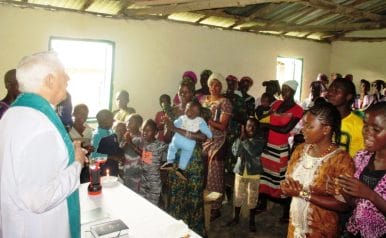
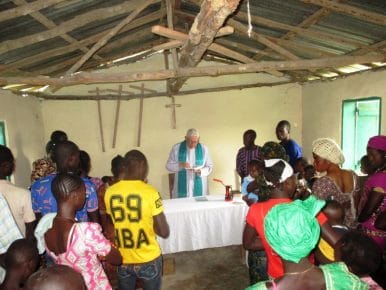 The first initiative of the Evangelii Gaudium Centre, created in Loppiano (Florence) to become the “Church that goes out,” is a qualification course in collaboration with the Sophia University Institute entitled, “Wake up the world.” This compelling slogan describes precisely Consecrated Life that will “Wake up the world,” in which consecrated persons with their radical choice of life, concur to restore true fraternity and communion in the world. It is the story of Fr. Antonio Guiotto in Sierra Leone: a Xaverian missionary. He had adhered to the spirituality of the Focolare ever since he was a student, and is now celebrating his 50th anniversary of priesthood, most of which was spent in the African country, and out of which around ten years (1991 to 2001) were in the frontline of a terrible civil war which terrorized and devastated Sierra Leone. And though like other foreigners he could have returned home, Fr. Antonio decided to remain in Kabala to share with its people all the events, helping them to continue believing in God’s immense love, despite everything. Very soon, he and Fr. Carlo, a congregation brother who also lived the Focolare spirit, created a small group that tried to live the Gospel and share their life experiences: a flicker of hope that lit up amid so much hatred and violence. But also Kabala was invaded by the rebels, and so the two religious – foreigners, and easy prey to kidnappers – took refuge in the woods. Despite the dangers, his people helped them with food and water, and in turn were supported by the light and hope which the two religious instilled in all. When there was no longer any imminent danger, they opened their homes since the missionary house had been completely destroyed. The family that hosted them shared the little they had, and the two religious gave a hand in the house and with the children. After a month, the couple asked to become Christians and for the children to be baptized. In the meantime, however, the situation started to worsen again. Squads of rebels roamed all over Sierra Leone and the two Fathers had to move to Freetown. It was a forced transfer which became an occasion to sow the Gospel also in the capital.
The first initiative of the Evangelii Gaudium Centre, created in Loppiano (Florence) to become the “Church that goes out,” is a qualification course in collaboration with the Sophia University Institute entitled, “Wake up the world.” This compelling slogan describes precisely Consecrated Life that will “Wake up the world,” in which consecrated persons with their radical choice of life, concur to restore true fraternity and communion in the world. It is the story of Fr. Antonio Guiotto in Sierra Leone: a Xaverian missionary. He had adhered to the spirituality of the Focolare ever since he was a student, and is now celebrating his 50th anniversary of priesthood, most of which was spent in the African country, and out of which around ten years (1991 to 2001) were in the frontline of a terrible civil war which terrorized and devastated Sierra Leone. And though like other foreigners he could have returned home, Fr. Antonio decided to remain in Kabala to share with its people all the events, helping them to continue believing in God’s immense love, despite everything. Very soon, he and Fr. Carlo, a congregation brother who also lived the Focolare spirit, created a small group that tried to live the Gospel and share their life experiences: a flicker of hope that lit up amid so much hatred and violence. But also Kabala was invaded by the rebels, and so the two religious – foreigners, and easy prey to kidnappers – took refuge in the woods. Despite the dangers, his people helped them with food and water, and in turn were supported by the light and hope which the two religious instilled in all. When there was no longer any imminent danger, they opened their homes since the missionary house had been completely destroyed. The family that hosted them shared the little they had, and the two religious gave a hand in the house and with the children. After a month, the couple asked to become Christians and for the children to be baptized. In the meantime, however, the situation started to worsen again. Squads of rebels roamed all over Sierra Leone and the two Fathers had to move to Freetown. It was a forced transfer which became an occasion to sow the Gospel also in the capital.  In 2000, an attempted coup d’etat further put their lives at risk, so much so that the Italian Ambassador decided to transfer them immediately to Guinea on a small plane. Despite these adversities, the spirituality of the Focolare transmitted with their lives, progressed in great leaps. The minute they could, a three-day Mariapolis was organized with 170 people, among which was also the Bishop of Makeni. «I can truthfully affirm – wrote Fr. Antonio – that the promise of Jesus that “Whoever has left their home, brothers and sisters, father or mother, children or field in my name, will receive the hundred fold,” had fully come true. In my mission I found that fathers, mothers, brothers and the hundredfold in this life was a deposit for that which would come. New Christians were born, many couples were married in church, and new Focolare communities arose in Freetown, Makeni, Kamabai, Kabala, and also in the remote villages. New churches and Catholic schools were built. After a period passed in Italy, the Lord has now granted me the grace to return to my beloved Sierra Leone to continue to give my life for my people.» From October 2016 to March h 2017, the course of the Evangelii Gaudium Centre addressing educators, tutors and students of missionary pastoral theology, will provide monthly, a two-day session during which the lesson will alternate with practice exercises, in order to become – as the brochure says – “experts of communion” who like Fr. Antonio, “wake up the world.” The October session concluded with around 20 enrollees, and the second will take place from 13 to 15 November. The course directors are two personages of great academic experience in Rome: Sr. Tiziana Longhitano sfp*, Rector of the Pontifical Urbania University and Fr. Theo Jansen ofmcap*, Professor of the Pontifical Antonianum University. *For info and course enrollment in Loppiano “Wake up the world”: Sr. Tiziana cell. +39.329.1663136, Fr. Theo cell. +39.338.6845737.
In 2000, an attempted coup d’etat further put their lives at risk, so much so that the Italian Ambassador decided to transfer them immediately to Guinea on a small plane. Despite these adversities, the spirituality of the Focolare transmitted with their lives, progressed in great leaps. The minute they could, a three-day Mariapolis was organized with 170 people, among which was also the Bishop of Makeni. «I can truthfully affirm – wrote Fr. Antonio – that the promise of Jesus that “Whoever has left their home, brothers and sisters, father or mother, children or field in my name, will receive the hundred fold,” had fully come true. In my mission I found that fathers, mothers, brothers and the hundredfold in this life was a deposit for that which would come. New Christians were born, many couples were married in church, and new Focolare communities arose in Freetown, Makeni, Kamabai, Kabala, and also in the remote villages. New churches and Catholic schools were built. After a period passed in Italy, the Lord has now granted me the grace to return to my beloved Sierra Leone to continue to give my life for my people.» From October 2016 to March h 2017, the course of the Evangelii Gaudium Centre addressing educators, tutors and students of missionary pastoral theology, will provide monthly, a two-day session during which the lesson will alternate with practice exercises, in order to become – as the brochure says – “experts of communion” who like Fr. Antonio, “wake up the world.” The October session concluded with around 20 enrollees, and the second will take place from 13 to 15 November. The course directors are two personages of great academic experience in Rome: Sr. Tiziana Longhitano sfp*, Rector of the Pontifical Urbania University and Fr. Theo Jansen ofmcap*, Professor of the Pontifical Antonianum University. *For info and course enrollment in Loppiano “Wake up the world”: Sr. Tiziana cell. +39.329.1663136, Fr. Theo cell. +39.338.6845737.
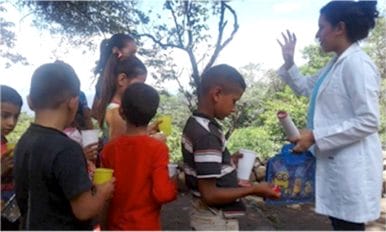
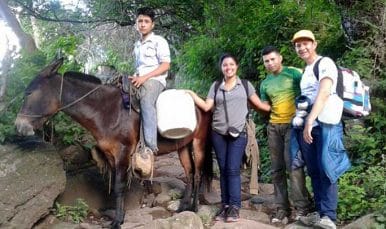 Selfless giving and receiving was the experience of the Youth for a United World from Managua, Nicaragua, during their visit to the small Focolare community of La Cal, a village that rises 1200 metres above sea level near the coffee capital of Jinotega. Armed with some bags of clothing, food, medicinals and toys that were all gathered by the community in Managua, they reached Jinotega after a 3-hour bus ride. Then they drove for 8 km in a pick-up until the road became too rough to travel on. It was still another kilometre and a half through a forest fraught with stones, crevasses and deep slopes that made the trek impossible even for the horses, and the young people had to continue on foot. “You could never imagine the wonderful welcome we received,” the young people report. The village of La Cal was in unstable condition. Its wooden houses teeming with children were without electricity, running water or medical supplies. There was a small shop in the village with some basic relief-items, a small school with one classroom, one teacher and a tiny chapel for when a pricst arrived for Mass. If not for the solar panels that were recently installed, the whole village would be in complete darkness.
Selfless giving and receiving was the experience of the Youth for a United World from Managua, Nicaragua, during their visit to the small Focolare community of La Cal, a village that rises 1200 metres above sea level near the coffee capital of Jinotega. Armed with some bags of clothing, food, medicinals and toys that were all gathered by the community in Managua, they reached Jinotega after a 3-hour bus ride. Then they drove for 8 km in a pick-up until the road became too rough to travel on. It was still another kilometre and a half through a forest fraught with stones, crevasses and deep slopes that made the trek impossible even for the horses, and the young people had to continue on foot. “You could never imagine the wonderful welcome we received,” the young people report. The village of La Cal was in unstable condition. Its wooden houses teeming with children were without electricity, running water or medical supplies. There was a small shop in the village with some basic relief-items, a small school with one classroom, one teacher and a tiny chapel for when a pricst arrived for Mass. If not for the solar panels that were recently installed, the whole village would be in complete darkness.  There were also two medical doctors with the Youth for a United World. One of them, a dentist who began the day with a presentation on oral hygiene to thirty children who so happy to use a tooth brush and toothpaste for the first time in their lives. At lunchtime one family wanted to offer some very warm and delicious tortillas, as the young people gathered the small children for games. In the afternoon presentations were offered for adults on parasite prevention. The very intense day concluded with a reading of the Word of Life, a deep spiritual moment that enveloped everyone. We were all very moved when an elderly man wished to give his blessing to the young people. This was followed by the distribution of goods that the young people had brought for them. They were offered an ex-chicken coop to sleep in that night. “It was so moving for us,” they write, “to spend the night in an ex-chicken coop just like the men in the first focolare whose house was an ex-chicken coop. In the morning, after a good breakfast that had been prepared by the women of the village, we were invited to return again soon and left for Jinotega. We went to the cathedral to thank God for the experience that had changed us so much, that had allowed us know such generous people who live their daily struggle with such dignity and joy of knowing God’s immense love for them – and for having had constructed in the midst of those mountains another small piece of universal brotherhood.”
There were also two medical doctors with the Youth for a United World. One of them, a dentist who began the day with a presentation on oral hygiene to thirty children who so happy to use a tooth brush and toothpaste for the first time in their lives. At lunchtime one family wanted to offer some very warm and delicious tortillas, as the young people gathered the small children for games. In the afternoon presentations were offered for adults on parasite prevention. The very intense day concluded with a reading of the Word of Life, a deep spiritual moment that enveloped everyone. We were all very moved when an elderly man wished to give his blessing to the young people. This was followed by the distribution of goods that the young people had brought for them. They were offered an ex-chicken coop to sleep in that night. “It was so moving for us,” they write, “to spend the night in an ex-chicken coop just like the men in the first focolare whose house was an ex-chicken coop. In the morning, after a good breakfast that had been prepared by the women of the village, we were invited to return again soon and left for Jinotega. We went to the cathedral to thank God for the experience that had changed us so much, that had allowed us know such generous people who live their daily struggle with such dignity and joy of knowing God’s immense love for them – and for having had constructed in the midst of those mountains another small piece of universal brotherhood.”